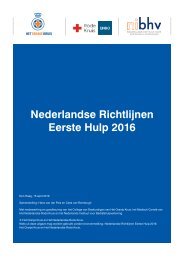Thesis-Anne-Vos-Masters-SBR-and-EU-Law-3
Thesis-Anne-Vos-Masters-SBR-and-EU-Law-3
Thesis-Anne-Vos-Masters-SBR-and-EU-Law-3
You also want an ePaper? Increase the reach of your titles
YUMPU automatically turns print PDFs into web optimized ePapers that Google loves.
stimulated by the Recommendation which states in Title 15 (on the dissemination of information)<br />
that MS should ensure that:<br />
the operator publicly disseminates information on the chemical substances <strong>and</strong> volumes of water that<br />
are intended to be used <strong>and</strong> are finally used for the high-volume hydraulic fracturing of each well.<br />
This information should list the names <strong>and</strong> Chemical Abstracts Service (CAS) numbers of all<br />
substances <strong>and</strong> include a safety data sheet, if available, <strong>and</strong> the substance’s maximum concentration<br />
in the fracturing fluid.<br />
Hitherto the <strong>EU</strong> institutions are discussed, but what about the Dutch competent authorities?<br />
Although they also have to comply with the <strong>EU</strong> obligations (of the Aarhus legislation) towards<br />
transparency <strong>and</strong> participation, they also have to comply with the Dutch principle of transparency<br />
<strong>and</strong> participation. According to the Code for Good Administration, the administration has to know<br />
what is going on in society <strong>and</strong> has to show what it does with this knowledge. This is of importance<br />
for shale gas activities in order to receive acceptation. With regard to the currently developing<br />
Structure Vision on Shale Gas, everybody is allowed to submit an opinion (zienswijze). The<br />
Minister of Economic Affairs has to react on all those opinions when finally adopting the structure<br />
vision. This latter is important. In order to gain acceptance, the Minister really has to show <strong>and</strong><br />
motivate how it took all the opinions into account. He has to 'show what it does therewith'.<br />
With regard to the transparency principle <strong>and</strong> the Dutch legislation on shale gas activities, it is also<br />
relevant to note that the formation of the Mining Council (who should advice on the permits<br />
according to the Mining Act) is secret, whereby it is unclear who sits in this Council. It would seem<br />
that an independent council should be transparent <strong>and</strong> that everybody should be able to find who<br />
sits in there. This is especially remarkable since the Mining Council has an important role in the<br />
licensing process <strong>and</strong> the granting of licenses for something such as shale gas activities is not<br />
something that should be thought light of.<br />
Moreover, the importance of transparency with regard to shale gas activities is also very relevant<br />
with regard to the drinking water companies. These companies have a duty of care to guarantee<br />
safe <strong>and</strong> health drinking water. To ensure this <strong>and</strong> to comply with their duty, they need to know<br />
what is in the flow back water, what chemicals are used, how much water will be left in the ground,<br />
etc. Currently, this is not at all clear.<br />
Finally, the participation <strong>and</strong> transparency principles breathe the necessity of involvement of the<br />
people. As stated, they are closely related to the principles of democracy <strong>and</strong> legitimacy.<br />
Especially with such a sensitive topic as shale gas extraction, these principles <strong>and</strong> thus the<br />
involvement <strong>and</strong> ideas of the people are really important. Therefore, there should really be listened<br />
to them. When looking at the Dutch approach, this is not happening. Currently, the Structure Vision<br />
on Shale Gas includes a discussion on the usefulness <strong>and</strong> necessity (nut en noodzaak) of shale<br />
gas exploration in the Netherl<strong>and</strong>s. It could however be argued that such a (public) debate should<br />
happen before the adoption of a structure vision, since this latter already sets out how <strong>and</strong> where<br />
shale gas extraction should occur in the Netherl<strong>and</strong>s.<br />
6.3 The integration principle<br />
The integration principle requires all Union's policies <strong>and</strong> activities to integrate environmental<br />
requirements. This means that this also applies to energy policies. It could be questioned whether<br />
the Recommendation of the Commission has integrated the environmental requirements<br />
sufficiently or whether it was more concerned with providing an overarching framework in order to<br />
stipulate the economic effects of shale gas activities.<br />
87



